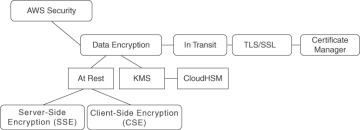Determining Appropriate Data Security Controls
In this sample chapter from AWS Certified Solutions Architect - Associate (SAA-C03) Cert Guide, 2nd Edition, you will learn how your organization can define the security and accessibility of data records stored at AWS, with coverage on key concepts such as data access and governance, Amazon EBS encryption, Amazon S3 bucket security, and AWS Certificate Manager.
This chapter covers the following topics:
Data Access and Governance
Amazon EBS Encryption
Amazon S3 Bucket Security
AWS Key Management Service
AWS Certificate Manager
This chapter covers content that’s important to the following exam domain and task statement:
Domain 1: Design Secure Architectures
Task Statement 3: Determine appropriate data security controls
Organizations have workloads and associated cloud services fail while operating at AWS. Amazon Elastic Compute Cloud (EC2) instances fail, Amazon Elastic Block Store (EBS) volumes crash, and cloud services can stop working. However, you shouldn’t have go to your boss and announce, “We’ve lost some data.” Fortunately, all data can be securely and redundantly stored at AWS.
All data stored at AWS using any storage service can be encrypted; organizations make the decision about whether encryption is required. However, Amazon S3 objects and S3 Glacier archive storage is automatically encrypted at rest. All other storage services at AWS store data records in an unencrypted state to start. For example, Amazon S3 buckets are encrypted using server-side encryption using Amazon S3, the AWS Key Management Service (KMS) with customer master keys (CMK) and data keys, or encryption keys supplied by each organization. Amazon EBS volumes—both boot and data volumes—can be encrypted at rest and in transit using CMKs provided by AWS KMS. Shared storage services such as Amazon EFS and Amazon FSx for Windows File Server can also be encrypted at rest, as can Amazon DynamoDB tables, Amazon Relational Database Service (RDS) deployments, and Amazon Simple Queue Service (SQS) queues.
AWS does not have single-tenant persistent data storage for individual organizations; all storage services offered at AWS are multi-tenant by design. AWS has the responsibility to ensure that each organization’s stored data records are isolated to the AWS account in which they are first created. Organizations can secure data at rest by choosing to encrypt all data records; protecting data in transit can be achieved using Transport Layer Security (TLS).
Each organization is in control of the storage and retrieval of its data records that are stored at AWS. It’s the organization’s responsibility to define the security and accessibility of all data records stored at AWS. All data storage at AWS starts as private storage only accessible across the AWS private network. Organizations can choose to make select Amazon S3 buckets public, but all other storage services offered by AWS remain private and are not publicly accessible across the Internet. AWS VPN and AWS Direct Connect connections from on-premises locations can directly access AWS storage services; however, EBS volumes can only be accessed through the attached EC2 instance. Figure 5-1 illustrates the options for data encryption at AWS that are discussed in this chapter.

Figure 5-1 Encryption Choices at AWS
“Do I Know This Already?”
The “Do I Know This Already?” quiz allows you to assess whether you should read this entire chapter thoroughly or jump to the “Exam Preparation Tasks” section. If you are in doubt about your answers to these questions or your own assessment of your knowledge of the topics, read the entire chapter. Table 5-1 lists the major headings in this chapter and their corresponding “Do I Know This Already?” quiz questions. You can find the answers in Appendix A, “Answers to the ‘Do I Know This Already?’ Quizzes and Q&A Sections.”
Table 5-1 “Do I Know This Already?” Section-to-Question Mapping
Foundation Topics Section |
Questions |
|---|---|
Data Access and Governance |
1, 2 |
Amazon EBS Encryption |
3, 4 |
Amazon S3 Bucket Security |
5, 6 |
AWS Key Management Service |
7, 8 |
AWS Certificate Manager |
9, 10 |
1. What AWS service assists in protecting access to AWS?
AWS Shield
Amazon Macie
Amazon EBS volumes
Amazon DynamoDB databases
2. What is the purpose of using detective controls?
To enable and enforce multifactor access
To detect and alert when security controls change
To manage AWS Organizations backups
To analyze compliance levels
3. Which of the following determines whether an attached Amazon EBS volume can be encrypted?
The type of Amazon EC2 instance
The size of the Amazon EBS volume
The type of the Amazon EBS volume
The IOPS assigned to the Amazon EBS volume
4. Where are data keys stored when they are delivered to an Amazon EC2 instance for safekeeping?
The associated Amazon EBS volume
Unsecured RAM
Secured RAM
AWS Key Management Service
5. What security policy allows multiple AWS accounts to access the same Amazon S3 bucket?
Amazon IAM policy
AWS IAM server control policy
Amazon S3 Bucket policy
Amazon IAM policy
6. What type of encryption can be carried out before uploading objects to Amazon S3 to ensure absolute encryption outside AWS control?
RSA encryption
AES 128-bit encryption
Client-side encryption
Server-side encryption
7. What is the advantage of importing your organization’s symmetric keys into AWS KMS?
High level of compliance
Faster encryption and decryption
Absolute control of encryption keys
None
8. What additional AWS service can work with AWS KMS as a custom key store?
Encrypted EBS volume
Encrypted Amazon S3 bucket
AWS CloudHSM
Encrypted AWS SQS queue
9. How does AWS charge for provisioning SSL/TLS certificates for AWS services using AWS Certificate Manager?
It charges per certificate per year.
It charges for private TLS certificates only.
It does not charge for AWS services.
It charges per certificate check.
10. Where are the security certificates for the AWS Application Load Balancer stored?
Amazon S3 bucket
Amazon EBS volume
AWS Certificate Manager
AWS KMS service
Foundation Topics